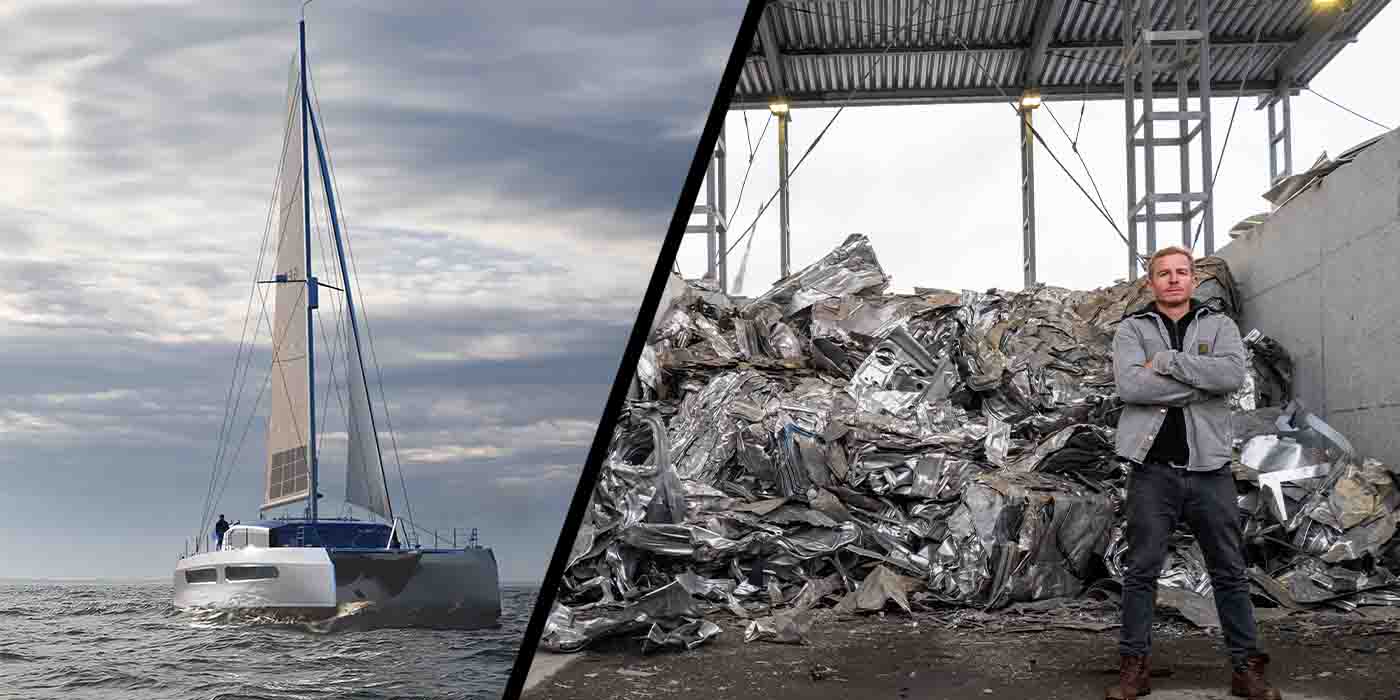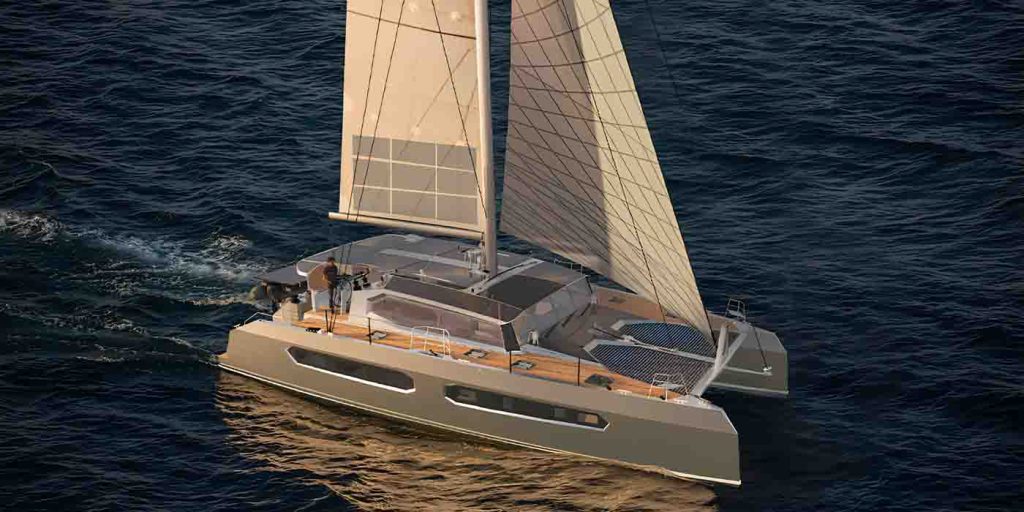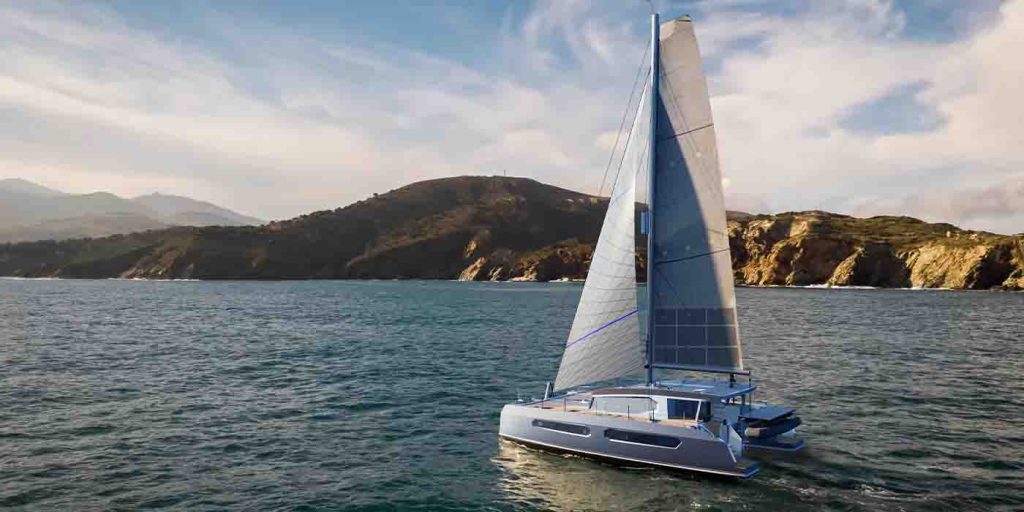
German yacht design and engineering studio iYacht GmbH unveiled a 55-foot solar-electric crusing catamaran referred to as the Hu’chu 55. Its makers describe it as “undoubtedly one of the crucial sustainable and compelling challenges undertaken thus far.” Constructed from over 90% scrap metallic, this vessel provides an admirable design lesson in circularity.
iYacht GmbH is a German yacht design studio with places of work in Hamburg and Kiel, led by CEO Udo A. Hafner. During the last twenty years, iYacht’s workforce of 11 engineers, designers, and naval architects has accomplished over 400 marine initiatives, from preliminary design sketches to “Conformite Europeenne” (CE) marking.
For its newest mission, iYacht was commissioned by actor, producer, and environmental entrepreneur Daniel Roesner to develop a photo voltaic electrical crusing catamaran designed, in the beginning, with circularity in thoughts. The result’s the Hu’Chu 55 – a mission iYacht’s CEO described as one in all its most bold thus far:
We’ve got designed and engineered a dozen multihulls lately, however the Hu’chu 55 represents a big leap ahead when it comes to sustainability and circularity. Daniel had a really bold imaginative and prescient, and we guided him in turning it right into a possible mission.
iYacht introduced all fingers on deck from each its design places of work to deliver Roesner’s imaginative and prescient to life, using a novel recycled aluminum developed explicitly for the Hu’Chu 55.
Hu’Chu 55 photo voltaic electrical crusing vessel is ultra-sustainable
In response to iYacht, the Hu’Chu 55 was constructed utilizing recycled and recyclable supplies, together with aluminum, developed by the actor/ catamaran proprietor with the assistance of a serious aluminum producer. The fabric contains over 90 % aluminum scrap from discarded license plates, street indicators, beauty cans, and automotive and building manufacturing, and not using a single kilogram of main metallic.
The result’s a photo voltaic electrical crusing catamaran constructed from materials that’s one-eighth of the market’s common footprint in CO2 emissions. Roesner additionally requested that different sustainable supplies, together with pure fibers, reclaimed wooden, and recycled cork, be included all through the vessel.
Whereas the Hu’Chu 55 is a crusing catamaran at its core, it’s supported by photo voltaic electrical expertise, together with photovoltaic panels that not solely generate electrical energy to energy an enhancing bay, develop greens, and deal with water onboard but in addition cut back total consumption.
When crusing isn’t potential, the photo voltaic catamaran is supplied with two electrical motors powered by a battery pack of over 100 kWh, which photo voltaic panels can even recharge. If the solar isn’t out, the batteries can be replenished through hydrogeneration, by which the boat’s movement passively spins the propellers of the electrical motor, producing a recharge via electromagnetic induction—type of like regenerative braking however for boats.
iYacht states that the Hu’Chu photo voltaic electrical crusing catamaran was designed so Roesner might reside aboard it, which he plans to do whereas concurrently producing documentaries in regards to the oceans and monitoring the water high quality. Per Roesner:
I’ve a big circle of buddies consisting of divers, free divers, scientists and underwater filmmakers. I wish to collaborate with them to implement numerous initiatives on subjects akin to environmental safety, analysis and journey. I additionally hope to work with numerous universities. The boat goes to be a platform for sustainable analysis, journey, movie and round dwelling. There are a number of inspirational initiatives on this planet which have helped me put collectively a few of their unconventional concepts. Amongst them are Low tech lab, Plastiki, and Vitality Observer. Hopefully the Hu’chu 55 will likely be an inspiration to others as effectively.
Trying forward, Roesner hopes to search out new companions that share in his quest for sustainability at sea and convey the Hu’Chu to collection manufacturing so extra individuals can make the most of the expertise and promote circularity in marine vessels.
FTC: We use revenue incomes auto affiliate hyperlinks. Extra.




